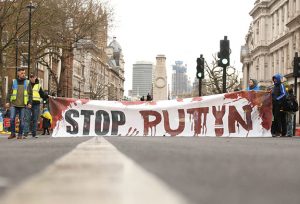Bloomberg
The UK was bracing for its biggest squeeze on living standards in decades even before Russia invaded Ukraine. The impact of the war is now threatening to deepen a crisis for the poorest households and pull millions more into financial trouble.
A spike in the price of oil has already pushed petrol and diesel prices to a record. Economists warn that further pressure on food and energy prices could mean inflation hits double digits later this year.
With domestic energy prices and taxes already rising next month and commodity markets highly volatile, pressure is growing on Chancellor of the Exchequer Rishi Sunak to ease the pain when he unveils a springtime mini-budget on March 23.
Before then, the Bank of England is widely expected to announce a third consecutive interest-rate rise when it meets on Thursday. Bloomberg Economics forecasts unanimous backing for a 25 basis-point rise, pushing rates up to 0.75%, in a bid to control surging price growth.
Without help from Sunak, the proportion of children living in absolute poverty is set to be higher in 2026-27 than it was at the start of the decade, the Resolution Foundation warns, something it said has “never seen before in modern Britain.â€
But the problems for Sunak — and his boss, Prime Minister Boris Johnson — stretch beyond the lowest-paid Britons. Accelerating inflation now means that families who rarely need to worry about the cost of living are also being dragged into difficulty.
With the next election not due until late 2024, both main parties will be vying for voters who have gone through a cost-of-living crisis in the wake of Covid-19 and Brexit.
The squeeze is already having an impact. At food banks across Britain, donors are becoming users, according to Sabine Goodwin, who runs the Independent Food Aid Network.
In supermarkets, Britons are likely to face higher bread prices because Russia and Ukraine make up almost a third of global exports of wheat, the price of which has risen by more than 50%. Yael Selfin, chief economist at KPMG, estimates this could add more than a percentage point to UK inflation.
Petrol prices rise at the fastest pace in almost 13 years in the week to March 7 as the war in Ukraine sent fuel prices to record highs. Official data show that richer households tend to spend more on transport.
At home, surges in wholesale natural gas and electricity markets mean a 54% increase in the energy price cap set by the official regulator Ofgem, planned for April, could be followed by another sharp rise in October.
On top of surging price growth, middle and higher earners will suffer most from a looming rise in the rate of National Insurance, a payroll tax.
National Energy Action warns that would put unprecedented pressure on Britons’ ability to pay for heating. “This could lead to households running up huge debt or even self-disconnecting,†said Peter Smith, the charity’s director of policy and advocacy.
The squeeze is underscored by the latest Bloomberg survey for the UK, carried out between March 4 and March 10, which saw economists’ cut their growth forecasts for the rest of 2022.
On inflation, Bloomberg Economics’ senior UK economist Dan Hanson says price growth could hit 10% in October. With the 2% target for inflation seen as out of reach, economists see the Bank of England delivering three more 25 basis-point rate increases this year. Markets are more hawkish, pricing in a rate of around 2% by the end of the year.
On top of surging price growth, middle and higher earners will also suffer most from a looming rise in the rate of National Insurance, a payroll tax.
The burden on the poorest is forecast to ease, because the threshold at which workers’ pay the tax is rising. But people earning anything more than 15,000 pounds ($20,000) — well below the median annual salary of 25,000 pounds — will face higher deductions.
 The Gulf Time Newspaper One of the finest business newspapers in the UAE brought to you by our professional writers and editors.
The Gulf Time Newspaper One of the finest business newspapers in the UAE brought to you by our professional writers and editors.
